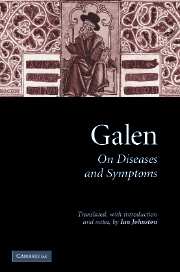Book contents
- Frontmatter
- Contents
- List of tables
- Acknowledgements
- List of abbreviations
- PART I INTRODUCTION
- I.1 General introduction
- I.2 Galen's life and works
- I.3 Galen's philosophical and medical antecedents
- I.4 Definitions and terminology
- I.5 The classification of diseases and symptoms
- I.6 Causation in diseases and symptoms
- PART II TRANSLATION
- PART III CONCLUSION
- Bibliography
- Index
I.3 - Galen's philosophical and medical antecedents
Published online by Cambridge University Press: 22 September 2009
- Frontmatter
- Contents
- List of tables
- Acknowledgements
- List of abbreviations
- PART I INTRODUCTION
- I.1 General introduction
- I.2 Galen's life and works
- I.3 Galen's philosophical and medical antecedents
- I.4 Definitions and terminology
- I.5 The classification of diseases and symptoms
- I.6 Causation in diseases and symptoms
- PART II TRANSLATION
- PART III CONCLUSION
- Bibliography
- Index
Summary
As should be readily apparent from the brief outline of Galen's life given above, he was well versed in philosophy and this is clearly reflected in his writings. That he had a detailed knowledge of earlier medical writings and an active engagement with contemporary medical theories and practices goes without saying. The extent to which other philosophers and doctors, both predecessors and contemporaries, are mentioned in his many works is very variable as, indeed, is the treatment they are accorded. Those referred to in the translated treatises in the present work are listed in Table 2. It is noteworthy that in these works references to, and remarks about, different individuals are altogether temperate in tone, in striking contrast with those in some of his other works, for example De methodo medendi.
Considering philosophers first, Plato is undoubtedly the one that Galen most obviously and overtly respected. As De Lacy writes:
Plato is repeatedly praised. He is first among philosophers, as Hippocrates is the best of all physicians. Like Hippocrates, he is ‘divine’. He is a member of the ‘chorus’ that is closest to God, whose members are devoted to the pursuit of the highest arts and sciences and are honoured equally with the gods.
The matters on which Plato is of particular relevance to Galen include: the basic structure of the body, relying on ideas of elements, qualities and humours as propounded in the Timaeus; the recognition of design in nature, involving the concept of the ‘Demiurge’; the tripartite division of the soul, including consideration of the physical correlates of the psychic; and, of special relevance to the present study, Plato's ideas on causation in general and in medicine in particular, as expounded primarily in the Timaeus and the Phaedo.
- Type
- Chapter
- Information
- Galen: On Diseases and Symptoms , pp. 11 - 20Publisher: Cambridge University PressPrint publication year: 2006



